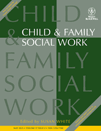
Child & Family Social Work
Scope & Guideline
Connecting research to real-world solutions for families.
Introduction
Aims and Scopes
- Child Welfare and Protection:
Research on systems, practices, and policies aimed at protecting children from abuse and neglect, including evaluations of child protection services and interventions. - Family Dynamics and Parenting:
Exploration of parenting styles, family structures, and dynamics, focusing on the impact of family relationships on child development and well-being. - Vulnerable Populations:
Studies addressing the needs and experiences of marginalized groups, including children in foster care, children with disabilities, and families facing socioeconomic challenges. - Mental Health and Resilience:
Investigations into the mental health of children and parents, resilience factors, and interventions aimed at improving mental health outcomes. - Cultural and Contextual Influences:
Examinations of how cultural, social, and economic contexts influence child welfare practices and family support systems. - Innovative Interventions and Practices:
Research on new methodologies and practices in social work, including the use of technology and community-based interventions.
Trending and Emerging
- Digital Parenting and Technology Use:
Research on the impact of digital technology on parenting practices and children's development is gaining traction, reflecting the growing relevance of technology in daily family life. - Mental Health Interventions:
There is a rising focus on mental health interventions for both children and parents, recognizing the critical role mental well-being plays in family dynamics and child development. - Community-Based Support Models:
Emerging research emphasizes the effectiveness of community-based support systems and interventions, moving away from traditional institutional models. - Cultural Competence in Child Welfare:
Increasing attention is being paid to cultural competence in child welfare practices, ensuring that interventions are sensitive to the diverse backgrounds of families. - Adverse Childhood Experiences (ACEs):
Research on ACEs is trending, exploring their long-term impacts on health and behavior, and emphasizing the need for early interventions to mitigate these effects. - Youth Participation in Decision-Making:
There is a growing emphasis on the importance of involving children and youth in decisions affecting their lives, promoting agency and empowerment within child welfare systems.
Declining or Waning
- Traditional Parenting Techniques:
Research focused on conventional parenting approaches, such as corporal punishment, is becoming less prevalent as newer studies emphasize positive parenting and non-violent disciplinary methods. - Institutional Care Models:
There has been a noticeable decline in research centered around institutional care models for children, reflecting a shift towards community-based and family-centered approaches. - Single-Factor Analyses:
Studies that analyze single factors affecting child welfare outcomes are less common, with an increasing preference for multifactorial and systemic analyses that consider broader social determinants. - Generalized Child Welfare Policies:
Research that broadly assesses child welfare policies without considering specific cultural or contextual factors is declining, as there's a growing emphasis on localized and culturally relevant approaches. - Focus on Child Maltreatment Alone:
While child maltreatment remains a critical topic, the exclusive focus on it is waning in favor of a more holistic approach that includes positive development and family support.
Similar Journals
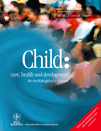
CHILD CARE HEALTH AND DEVELOPMENT
Pioneering research for nurturing young minds.Child Care Health and Development is a prestigious journal published by Wiley, dedicated to advancing the fields of child health and developmental psychology. With a rich publication history spanning from 1975 to 2024, this journal holds significant influence and credibility, illustrated by its impressive ranking in diverse categories such as Q1 in Pediatrics, Perinatology and Child Health and Q2 in Developmental and Educational Psychology as of 2023. The journal serves as an essential platform for researchers, practitioners, and students, promoting interdisciplinary studies that address pressing issues in child care, health, and development. While currently not an open-access journal, it still provides critical insights into public health and environmental factors affecting children, evidenced by its Scopus rankings. The journal is published in the United Kingdom and continues to impact the academic community by fostering knowledge dissemination and supporting practices that enhance the welfare of children globally.

Child and Adolescent Social Work Journal
Transforming Challenges into Opportunities in Social WorkChild and Adolescent Social Work Journal is a premier scholarly publication focused on the critical field of social work, particularly addressing the unique needs and challenges faced by children and adolescents. Published by Springer in the United States, this journal boasts an impressive impact factor reflected in its Q1 ranking in Social Sciences (miscellaneous) and Q2 in Social Work as of 2023, evidencing its influential contributions to the discipline. The journal is indexed with notable recognition, including a ranking of #99 out of 604 in Social Sciences (miscellaneous) and #57 out of 275 in General Social Sciences, showcasing its robust academic standing. With a publication history dating from 1984 to 2024, it serves as a crucial platform for researchers, professionals, and students to exchange insights, develop practices, and inform policy-making that supports the welfare of youth. The journal’s commitment to advancing knowledge and fostering an understanding of complex social issues ensures its continued relevance in fostering the growth of effective social work practices.
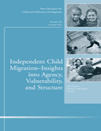
New Directions for Child and Adolescent Development
Navigating the complexities of youth psychology and education.New Directions for Child and Adolescent Development, published by Wiley-Hindawi, is a leading journal dedicated to advancing knowledge in the fields of child and adolescent psychology, educational development, and social psychology. With an impressive Q1 ranking in multiple categories—including Developmental and Educational Psychology and Social Psychology—this journal stands at the forefront of research innovation, making significant contributions to understanding developmental processes and challenges faced by children and adolescents. The journal spans a comprehensive publishing history from 1978 to 2023, allowing for a rich dialogue among researchers, practitioners, and students eager to explore emerging trends and methodologies. Researchers can access a wealth of studies and theoretical frameworks, enhancing the journal's stature within the academic community. New Directions for Child and Adolescent Development remains an invaluable resource for anyone committed to improving the lives of younger populations through evidenced-based practices and policies.
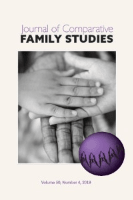
JOURNAL OF COMPARATIVE FAMILY STUDIES
Charting New Territories in Family Research and AnalysisJOURNAL OF COMPARATIVE FAMILY STUDIES is a premier academic journal published by University of Toronto Press Inc. Since its inception in 1973, the journal has established a significant presence in the fields of anthropology, sociology, and social psychology, earning a distinguished Q1 categorization in anthropology and positioning itself within the top ranks across various social sciences disciplines. With a focus on comparative analyses of family structures and dynamics, this journal serves as an essential resource for researchers, professionals, and students interested in understanding familial complexities across cultures and societies. Although it is not an open-access journal, the quality of research published is paramount, with Scopus rankings placing it in the 83rd percentile for anthropology. The journal aims to foster scholarly dialogue and advance knowledge, making it a vital platform for those devoted to the study of family systems. Its dedication to rigorous research reflects the importance of family relationships in broad social contexts, affirming its relevance in contemporary academic discourse.

Australian Social Work
Advancing social work through rigorous research.Australian Social Work, published by Routledge Journals, Taylor & Francis Ltd, stands as a leading academic journal dedicated to advancing the field of social work through rigorous research and scholarly discourse. Since its inception in 1971, the journal has provided a vital platform for researchers, practitioners, and students to engage with contemporary issues and developments within social work and its related disciplines. With an impressive 2023 impact factor reflected in its Q1 and Q2 rankings across prominent categories such as Social Sciences and Health (social science), it is recognized for its quality and relevance in the field. The journal does not offer open access, ensuring that its articles maintain a high standard of peer review while catering to a targeted readership. By exploring critical topics and fostering interdisciplinary dialogue, Australian Social Work contributes significantly to the evolution of social work practice and policy, positioning itself as an indispensable resource for those committed to academic excellence and social betterment.

PSYCHIATRIE DE L ENFANT
Bridging theory and practice in child mental health.PSYCHIATRIE DE L ENFANT is a distinguished academic journal published by PRESSES UNIV FRANCE, focusing on the significant realm of child psychiatry and developmental psychology. With its ISSN 0079-726X and E-ISSN 2102-5320, this journal provides a platform for researchers, practitioners, and educators to explore various topics surrounding mental health in children. Although the coverage in Scopus has been discontinued since 2018, with ranks highlighting its placement in the Developmental and Educational Psychology and Psychiatry and Mental Health categories, the journal's contributions remain pivotal for professionals aiming to advance their understanding of child mental health. Though it does not currently offer open access, the journal invites rigorous studies, clinical insights, and theoretical discussions that are crucial for the evolution of child psychiatry. As such, PSYCHIATRIE DE L ENFANT plays an essential role in shaping future research and practices in the field.

Nordic Social Work Research
Advancing Nordic Perspectives in Social Work ResearchNordic Social Work Research, published by Taylor & Francis Ltd, is a pivotal academic journal dedicated to the field of social work, particularly within the Nordic context. With an ISSN of 2156-857X and an E-ISSN of 2156-8588, the journal aims to disseminate high-quality research that contributes to the understanding and development of social work practice, policy, and education in the region. As of 2023, it holds a commendable Q2 rank in Social Sciences (miscellaneous) according to category quartiles, positioning it among the top-tier journals in this domain. Its Scopus ranking places it at #182 out of 604 in the social sciences category, reflecting its growing impact within the academic community with a notable percentile of 69th. Nordic Social Work Research seeks to foster interdisciplinary dialogues among researchers, practitioners, and students, encouraging innovative approaches to contemporary social challenges. The journal operates under a rigorous peer-review process, ensuring the dissemination of influential studies that inform both theoretical and practical advancements in social work. With a convergence period from 2011 to 2024, this journal remains at the forefront of social work research, inviting contributions that explore diverse aspects of social welfare in Nordic countries.
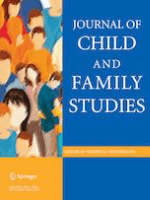
Journal of Child and Family Studies
Bridging Theory and Practice in Child and Family ResearchWelcome to the Journal of Child and Family Studies, a prominent academic platform published by Springer that delves into the intricate interrelations of child development and familial dynamics. Established in 1992 and continually evolving, this journal has become a vital resource for researchers, practitioners, and students engaged in Developmental and Educational Psychology as well as Life-span and Life-course Studies. With a solid categorization in the Q2 quartile for both fields as of 2023, the journal holds a noteworthy Scopus ranking, emphasizing its relevance and impact within the social sciences. Although the journal is not open access, it provides invaluable insights, empirical studies, and theoretical discussions, contributing significantly to the understanding of children's needs and family systems across various contexts. Positioned in the heart of New York City, the Journal of Child and Family Studies continues to influence policy-making and educational practices by disseminating innovative research that addresses the complexities of child and family life.
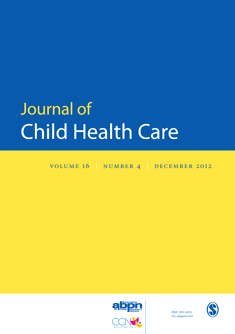
Journal of Child Health Care
Shaping the future of pediatric health one study at a time.The Journal of Child Health Care, published by SAGE Publications Ltd, is a leading academic journal focused on advancing the field of pediatric health. With an ISSN of 1367-4935 and an E-ISSN of 1741-2889, this esteemed journal has maintained a reputation for excellence since its inception in 1997. Covering a wide range of topics in pediatric nursing and child health, it is proudly ranked in the Q1 category of Pediatrics and Q2 in Pediatrics, Perinatology, and Child Health as per the 2023 category quartiles. The Scopus ranking places it among the top resources in the fields of Nursing and Pediatrics, with an impressive 90th percentile ranking. Researchers, healthcare professionals, and students rely on this journal for cutting-edge insights, innovative practices, and evidence-based research that significantly contribute to improving child health outcomes. Although it does not currently offer an open access option, its rigorous peer-review process ensures the highest quality of published research. With contributions shaping the future of child health care, the Journal of Child Health Care stands as a vital resource for those committed to enhancing pediatric wellness in the United States and beyond.
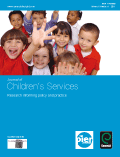
Journal of Childrens Services
Fostering Collaboration for Children's Success.Journal of Children's Services, published by Emerald Group Publishing Ltd, serves as a leading platform for research and discourse in the realms of social science, particularly focusing on developmental and educational psychology, health, law, and sociology. With an ISSN of 1746-6660 and an E-ISSN of 2042-8677, this journal not only addresses critical issues faced by children today but also offers valuable insights into effective practices within the community and institutional settings. Since its inception in 2006, the Journal has been progressively recognized, securing a Q3 ranking in Developmental and Educational Psychology and Q2 in Education and Health (Social Science) as of 2023, reflecting its growing impact on the academic community. Moreover, its commendable rankings within the Scopus database underscore its relevance, particularly in the fields of Law and Sociology and Political Science. Although the journal does not currently offer Open Access options, its rigorous peer-review process ensures that all published content meets high academic standards. The Journal of Children's Services is a vital resource for researchers, practitioners, and students dedicated to improving outcomes for children, encouraging innovation and collaboration across disciplines.